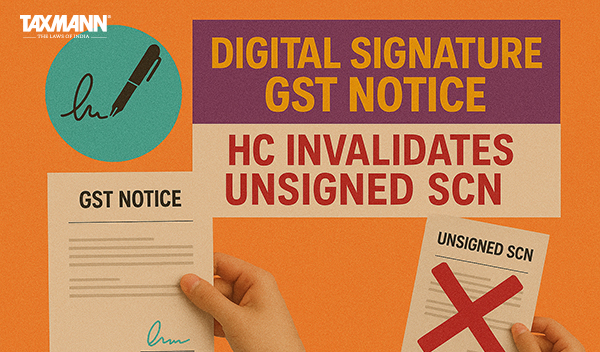Digital Signature GST Notice – HC Invalidates Unsigned SCN
- Blog|News|GST & Customs|
- 2 Min Read
- By Taxmann
- |
- Last Updated on 21 May, 2025

Case Details: Sandip Kumar Singh vs. State of Jharkhand - [2025] 174 taxmann.com 412 (Jharkhand)
Judiciary and Counsel Details
- M.S. Ramachandra Rao, CJ. & Rajesh Shankar, J.
-
P.P.N. Roy, Sr. Adv. & Deepak Kumar Ruia, Adv. for the Petitioner.
-
Sahbaj Akhtar, A.C. to AAG-III for the Respondent.
Facts of the Case
The assessee, being the petitioner, was issued an intimation in Form GST DRC-01A under Section 73(1) of the CGST Act for determination of tax not involving fraud, suppression, or wilful misstatement. This intimation was followed by a show cause notice (SCN), also issued under Section 73(1), initiating adjudication proceedings. Both the Form GST DRC-01A and the SCN were served electronically through the GST portal. Relying on these documents, the proper officer proceeded to pass a demand order confirming the proposed tax liability.
The petitioner challenged the proceedings before the Hon’ble High Court of Jharkhand, specifically asserting that both the intimation and the SCN were not digitally signed, thereby violating Rule 26(3) of the CGST Rules and corresponding rules under the Jharkhand GST Rules. The petitioner contended that digital authentication was a mandatory statutory requirement for any notice or document issued electronically under the GST law.
High Court Held
The Hon’ble Jharkhand High Court held that the absence of a digital signature on the electronically issued Form GST DRC-01A and the SCN vitiated the entire adjudication proceedings. The Court emphasised that Rule 26(3) of the CGST Rules explicitly requires all documents issued electronically—such as notices and orders—to be digitally signed by the proper officer. Since both the initial intimation and the SCN lacked such digital authentication, they were rendered invalid in law.
List of Cases Referred to
- Rajendra Modi v. State of Jharkhand [W.P. (T) No. 1354 of 2025, dated 21-3-2025] (para 3).
Disclaimer: The content/information published on the website is only for general information of the user and shall not be construed as legal advice. While the Taxmann has exercised reasonable efforts to ensure the veracity of information/content published, Taxmann shall be under no liability in any manner whatsoever for incorrect information, if any.

Taxmann Publications has a dedicated in-house Research & Editorial Team. This team consists of a team of Chartered Accountants, Company Secretaries, and Lawyers. This team works under the guidance and supervision of editor-in-chief Mr Rakesh Bhargava.
The Research and Editorial Team is responsible for developing reliable and accurate content for the readers. The team follows the six-sigma approach to achieve the benchmark of zero error in its publications and research platforms. The team ensures that the following publication guidelines are thoroughly followed while developing the content:
- The statutory material is obtained only from the authorized and reliable sources
- All the latest developments in the judicial and legislative fields are covered
- Prepare the analytical write-ups on current, controversial, and important issues to help the readers to understand the concept and its implications
- Every content published by Taxmann is complete, accurate and lucid
- All evidence-based statements are supported with proper reference to Section, Circular No., Notification No. or citations
- The golden rules of grammar, style and consistency are thoroughly followed
- Font and size that’s easy to read and remain consistent across all imprint and digital publications are applied



 CA | CS | CMA
CA | CS | CMA
